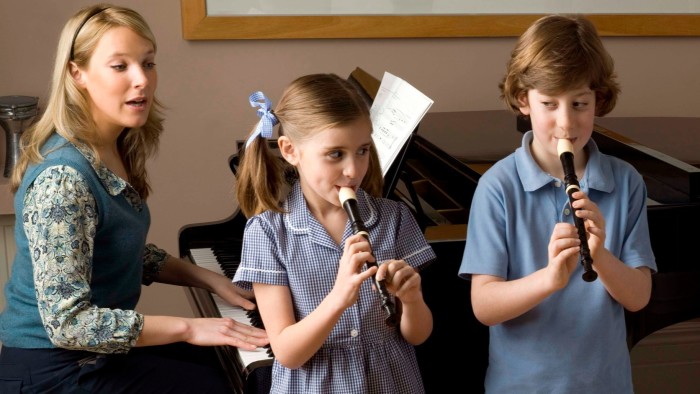Unlock the Editor’s Digest for free
Roula Khalaf, Editor of the FT, selects her favourite stories in this weekly newsletter.
Primary school parents everywhere may be breathing sighs of relief at the news that fewer children are learning the recorder. In the wrong, slightly sticky hands, the instrument is capable of producing a piercing keen that makes one yearn for the comparably sweet sounds of mating foxes or a circular saw.
But there are good reasons to be worried about the decline in recorder playing, revealed this week by the Associated Board of the Royal School of Music’s latest survey on music-making.
The recorder has been the instrument of kings from Henry VIII to our own monarch, who made headlines playing one made out of a carrot at a recent reception. But it has also been the main entry-level instrument for young children in the UK at least since the 1950s, when Carl Orff — best known as the composer of “Carmina Burana” but also a pioneering music educator — featured it in his influential “Schulwerk” programme for budding musicians. Simple to learn, the recorder is accessible too — cheap plastic ones require almost no maintenance and are small enough to be stuffed into a book bag.
The survey says the decline is indicative, in part, of a shift in musical education, as instruments such as the electric guitar, flute and ukulele grow in popularity at school. The appeal of these alternatives is not hard to understand; few children dream of shredding the recorder solo from Bach’s Brandenburg Concerto No 4.
But this is only part of the story. The precipitous fall in numbers of children playing the recorder, from 28 per cent in 2014 to 16 per cent today, may also reflect the steady deterioration of musical education in the UK. An Ofsted report in 2023 found that while almost every primary school introduces children to music as part of the national curriculum, only half provide instrumental or vocal tuition. The board’s survey found “cliff edges” in music participation at ages 12 and 15, too. GCSE numbers have plummeted. Many schools lack specialist staff.
The main difference between a sweet, lyrical recorder solo and one that sounds like a live vivisection is a good teacher. But in secondary schools, there are nearly 1,000 fewer music teachers today than in 2012. Around a third of the teachers in the survey said they didn’t plan to stay beyond five years.
The recorder may well be suffering as some students pick up different instruments. But only the best-funded schools can afford to distribute electric guitars to a class of seven-year-olds. For all that recorders make a ghastly howl if blown by an overeager child, they represent an affordable way to introduce young people to concepts like melody, rhythm, technique and musicality. The fact that they are falling out of favour suggests access to musical tuition is narrowing.
Will this change? Bridget Phillipson, the education secretary, has rued that music and the arts more broadly are now “the preserve of parents who have extra money and can pay for clubs and classes on a weekend”. With a government-commissioned review of the school curriculum in the works, charities and advocates argue for music to become a core subject like maths and English. The UK Association for Music Education is calling for the government to fill a £161mn “black hole” in funding so-called music hubs set up in 2011.
The investment would be worth it. Music can be a joyful, fulfilling hobby and a rewarding profession, but it’s also a blueprint for accomplishment. Learning the piano and the trumpet as a child has shaped my adult life — from the self-discipline required to practise and improve to the focus that live performance demands.
Don’t just take my word for it, ask the prime minister. Keir Starmer, before embarking on a career in the law and politics, was a Guildhall music scholar playing the flute, the piano — and, yes, the recorder.




